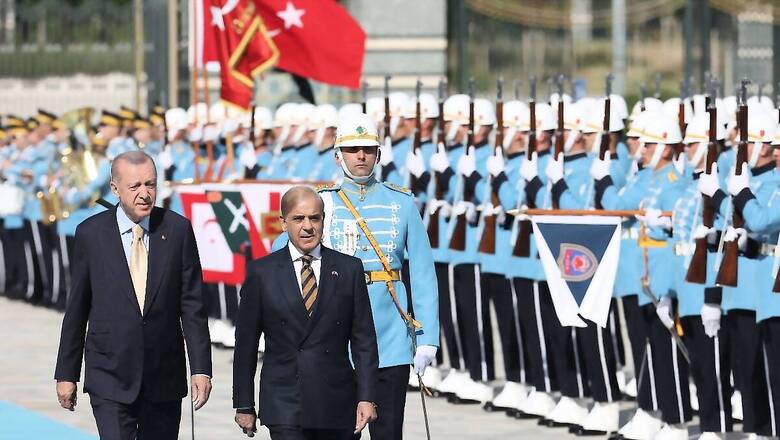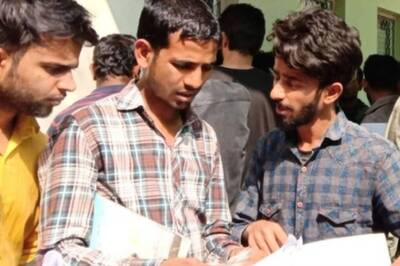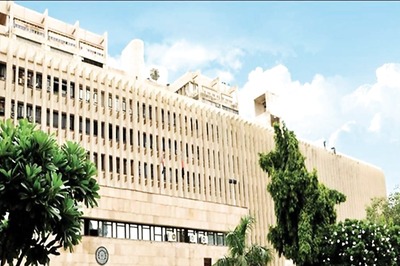
views
Last month, some media reports suggested that a Turkish government official, in a closed-door meeting in the Parliament, disclosed that the country had de-facto blacklisted India for weapons exports as it is deepening its relationship with India’s neighbouring rival, Pakistan. Although the MEA quickly dispelled these reports, declaring them “disinformation”, there are many signals that show India-Turkey relations plummeting.
Previously, India had ceased weapons shipments to Turkey and cancelled a major naval shipbuilding deal of $2.5 billion with a Turkish defence company, to eventually give it to an Indian firm based in Kochi. Despite similarities between the two countries in terms of being regional heavyweights and among the fastest-growing economies, Turkey’s President Recep Tayyip Erdogan’s ideological posturing and geostrategic closeness with Pakistan is appearing to instigate a shadow-rivalry between the two nations.
Erdogan emerged on the Turkish political scene in 2003. Since then he has progressively consolidated power and has made an effort to make Turkey a nation based on ‘neo-Ottomanism’.
‘Neo-Ottomanism’ is considered to be a form of Islamic revivalism, that is rooted in Turkish nationalism and frames itself along the bygone Ottoman Empire of which Turkey is the successor state. Based on this ideological orientation, Erdogan seeks to project Turkey as the leader of the Islamic world and has been taking steps, both in terms of domestic and foreign policy towards this end. Internally, a notable measure has been Turkey’s spectacular transformation of its indigenous defence industry.
In the past quarter century, Turkey went from being the world’s third-biggest receiver of military gear to twelfth-biggest weapons exporter, gaining an enviable reputation for land, naval and aerospace defence equipment, most prominently its UCAVs, particularly the Bayraktar TB2 drones. President Erdogan has been leveraging this increased military capability to buttress his Islamic-nationalist aspirations for Turkey, a case in point being his burgeoning engagement with Pakistan.
Although the Turkey-Pakistan bonhomie goes back to the initial days of the Cold War when both countries decided to side with the US to contain Soviet expansionism, under Erdogan, this relationship has been strengthened in a contemporary geopolitical context. Erdogan with his bid to establish Turkish supremacy over the Islamic world and Pakistan with its perennial crisis of identity found convenient partners in each other, manifesting in their military, diplomatic, and economic ties.
In recent years, Turkey has emerged as the second-biggest arms supplier for Pakistan after China. Under Turkey’s first and only submarine modernisation project, Pakistan has been upgrading its AGOSTA 90B Class submarines. This project has been undertaken by STM which is one of Turkey’s leading weapons manufacturers. In 2018, the Pakistani Navy commissioned a 17,000-tonne fleet tanker, the largest warship ever constructed in Pakistani naval history, manufactured jointly with the STM.
Previously in the same year, under the largest contract ever undertaken by the Turkish defence industry, Pakistan granted a multi-billion-dollar assignment of supplying four corvettes for the Pakistani Navy. In the air defence department, Turkey has supplied 34 T-37 aircraft, along with spares, to Pakistan. For its part, Turkey agreed to buy 52 Super Mushshak trainer aircraft from Pakistan. Last year, Pakistan Air Force acquired Bayraktar Akinci drones from Turkey, significantly upgrading its military apparatus. This extensive arms trade is supplemented with regular training exchange programmes between the two countries’ militaries.
In addition to military engagement, Turkey has been providing support to Pakistan on multiple forums. For instance, in 2020, Turkey was the only country out of 39 member states of the Financial Action Task Force to support the removal of Pakistan from its grey list. Ironically, next year, Turkey itself was added to the list, that monitors activities related to terror financing and money laundering. Turkey has also supported Pakistan’s addition to the Nuclear Suppliers Group (NSG), even though it was one of the few countries that opposed India’s membership in the same. More prominently and much to India’s distaste, Turkey has taken a vehemently anti-India position on the subject of Kashmir, particularly since the abrogation of Article 370, and brought up the matter repeatedly at the UN, parroting the stand taken by Pakistan.
Another reason behind the Turkey-Pakistan closeness is that both are illegal occupiers. While Pakistan administratively controls the Pakistan-occupied Kashmir, Turkey lays claim to the territory of neighbouring Cyprus. Both countries have supported each other’s stances on these issues. In the context of domestic policy too, Turkey has subjected its minority Kurdish population to violent persecution, cultural genocide and systemic discrimination, whereas Pakistan has carried out similar policies in Balochistan and Khyber Pakhtunkhwa.
However, of late, economic imperatives are seeming to compel Turkey to soften its position towards some countries against whom it had taken an adverse stance. The Turkish economy has been suffering from calamitous inflation rates, with the annual consumer price inflation reaching over 75 per cent this May. The Turkish lira has been consistently tumbling, leading Erdogan to attempt to make common cause with the Gulf, Saudi Arabia, and China. Given these circumstances, Turkey needs to look at India, not from Pakistan’s lens.
Turkey needs to realise that a good relationship with India will help both countries, as well as play an important role in ensuring geo-political stability. Turkey has also been trying to join the Shanghai Cooperation Organisation, for which it requires India’s support. Therefore, it would be in Turkey’s interest to recalibrate its foreign policy and offer an olive branch to India.
The writer is an author and columnist and has written several books. His X handle is @ArunAnandLive. Views expressed in the above piece are personal and solely those of the author. They do not necessarily reflect News18’s views.

















Comments
0 comment